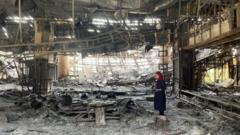The United States is preparing to formalize its decision to remove Hayat Tahrir al-Sham (HTS) from the list of foreign terror groups, reflecting changing dynamics following the Assad regime's ousting and broader efforts to rejuvenate Syrian relations internationally.
US Decision to Delist HTS Marks New Era in Syrian Relations

US Decision to Delist HTS Marks New Era in Syrian Relations
The US plans to remove the Syrian Islamist group HTS from its list of foreign terrorist organizations, signaling a shift in diplomatic relations with Syria.
The US is set to announce the removal of Hayat Tahrir al-Sham (HTS), a Syrian Islamist group, from its foreign terrorist organizations list this Tuesday, according to a state department memo. The decision comes after HTS, known for leading a rebel offensive that ousted Bashar al-Assad's long-standing regime, has taken on a new political role under the leadership of Ahmed al-Sharaa, who is now the interim president of Syria.
Originally affiliated with al-Qaeda, HTS distanced itself from the group in 2016, a pivotal moment that has now influenced its newfound legitimacy. In the wake of HTS's rise, Western nations, including the US, have sought to reset ties with Syria, which has been subjected to severe economic sanctions targeting the previous regime. In June, President Trump signed an executive order aimed at lifting US sanctions, with the White House stating that this move supports Syria's journey towards stability and peace.
Syrian Foreign Minister Asaad al-Shibani welcomed the US decision, stating it could facilitate economic recovery and reinvigorate Syria's engagement with the international community. Additionally, Syria has expressed its willingness to work with the US to revisit a 1974 disengagement agreement with Israel.
In a notable diplomatic move, UK Foreign Secretary David Lammy visited Syria over the weekend, making him the first UK minister to do so since the uprising began in 2011. Following his meetings with al-Sharaa, he announced £94.5m in additional support for long-term recovery and assistance for Syrian refugees.
However, the transition in governance has prompted skepticism among citizens regarding al-Sharaa's intentions and the functioning of his administration. To date, only one woman has been appointed to the government, and reports of violence against minority communities, such as the Alawites and Druze, raise further concerns about the stability of the new regime. Al-Sharaa's government faces scrutiny over past extremist affiliations and ongoing security challenges, as incidents of violence—including a recent suicide bombing in Damascus—highlight the turbulent landscape of post-Assad Syria.



















